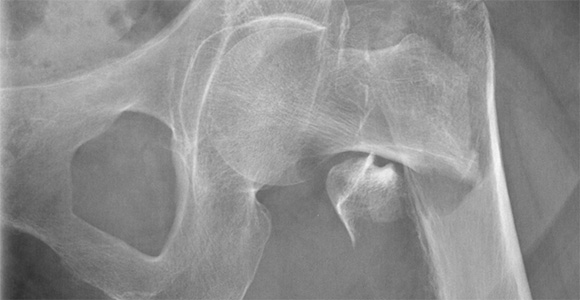
New study: Decline in hip fractures, increase in hip surgeries
Fewer elderly people are experiencing hip fractures, but more are receiving hip replacements due to osteoarthritis.
A new study from the University of Southern Denmark and Copenhagen University Hospital Bispebjerg shows a decline in the frequency of hip fractures among the elderly, but an increase in hip surgeries.
Researchers have discovered a significant decrease in hip fractures among older adults. This positive development is likely due to better treatment of osteoporosis, fall prevention, increased physical activity, and fewer smokers.
-The significant drop in hip fractures among the elderly suggests that the focused efforts on bone health and fall prevention are paying off, says Troels Mygind Jensen, assistant professor at the Danish Centre for Aging Research at the University of Southern Denmark and lead author of the study. The study was recently published in JAMA Network Open.
More hip replacements
While hip fractures have decreased, the number of hip surgeries has increased, especially among the oldest individuals. Improvements in anaesthesia and surgical techniques make it safer to operate on older patients. This reflects a positive trend where modern medical technology helps more elderly people maintain their mobility and quality of life.
-The increase in surgeries despite fewer hip fractures reflects an important societal development. We see a positive trend in the use of modern medical technology that enables more elderly people to maintain their mobility and quality of life, says Troels Mygind Jensen.
The rise in the number of surgeries may also indicate a change in attitudes towards the necessity of treatment among both doctors and elderly citizens.
-We know that the healthcare system previously had both formal and informal age limits for certain procedures and treatments. This means that, roughly speaking, there might have been a consideration of whether it was 'worth it' to treat the oldest patients, explains Troels Mygind Jensen.

A more inclusive healthcare system
The study shows no signs of age-based discrimination in connection with hip surgeries. This indicates a more inclusive healthcare system where age is not a barrier to quality treatment.
-Our results show that we are moving towards a more inclusive healthcare system where age is not a barrier to quality treatment. This is crucial for ensuring equity in healthcare and building a society where all age groups receive the necessary treatment, says Troels Mygind Jensen.
Kaare Christensen, professor at the Danish Centre for Aging Research and the study's senior author, adds: -In just a few decades, we have gone from being very reluctant to treat the oldest patients to now seeing people aged 90+ getting new hips due to osteoarthritis, even those over 100. It's a joyous and correct development that people are not excluded solely based on age.
Professor Søren Overgaard from the Orthopaedic Surgery Department at Copenhagen University Hospital Bispebjerg, a co-author of the study, emphasises:
-In the coming years, it will be a central challenge for the healthcare system to find the right level in a treatment strategy for elderly people with degenerative joint diseases, as we have an ever-growing group of very old Danes.
Meet the Researcher
Troels Mygind Jensen is assistant professor at the Danish Centre for Aging Research at the University of Southern Denmark and lead author of the study.
Meet the Researcher
Kaare Christensen is Professor of Epidemiology, Biostatistics and Biodemography and Head of Research at the Danish Aging Research Center, Department of Public Health.
About the study
The study is based on data from 3,664,979 individuals aged 40 to 104 years from 1996 onwards.
Decline in hip fractures: Among individuals aged 80 to 104, the frequency of hip fractures has decreased by 35% to 40%.
Increase in hip surgeries related to hip fractures: The proportion of individuals receiving a new hip after a fracture has increased by 50% to 70%. The increase is greatest among those over 75 years.
Increase in hip surgeries related to osteoarthritis: The frequency of hip surgeries performed to treat osteoarthritis in the age group 75 to 99 has significantly increased. The rise ranges from 60% to 100%, indicating almost a doubling in the frequency of such surgeries in this age group over the given period.
These figures highlight significant changes in treatment patterns and the health status of the elderly in Denmark.